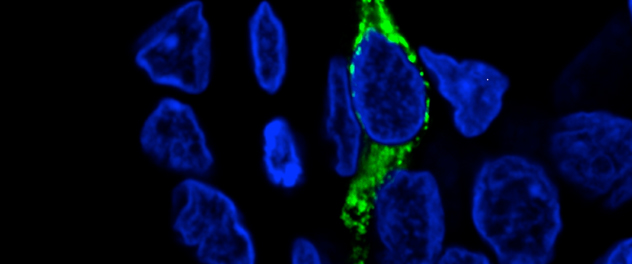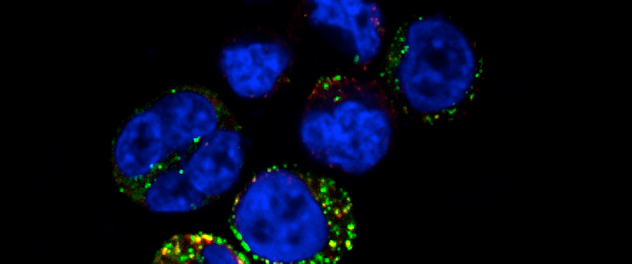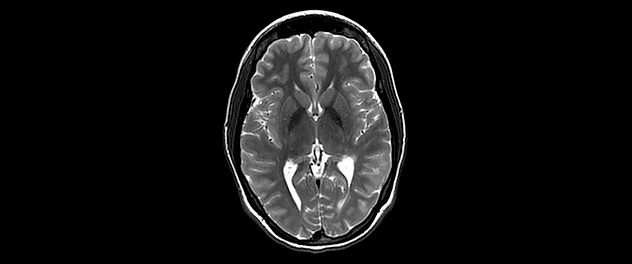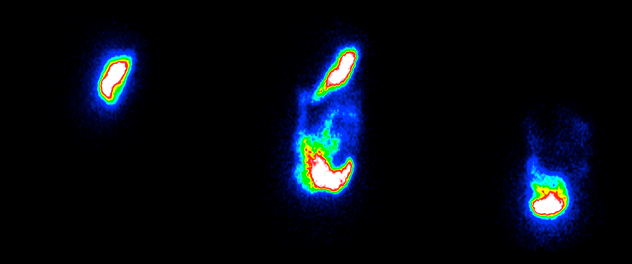-

Attacking the epidemic of obesity from the inside out
The Precision Medicine for Obesity Lab led by Andres J. Acosta, M.D., Ph.D., at Mayo Clinic is working to treat obesity by understanding the mechanisms behind food intake regulation and weight to develop individualized therapies.
-

Glucagon-like peptide-1 producing enteroendocrine L-cell within the colonic epithelium
Dr. Acosta's lab uses immunofluorescence confocal microscopy to a show glucagon-like peptide-1 (GLP-1;green) producing enteroendocrine L-cell within the human colonic epithelium.
-

Microscopic imagery of cells enables satiety hormone research
NCI-H716 cells, an in vitro model of human enteroendocrine cells, enable research on satiety hormones GLP-1 (green) and PYY (red) as shown in this immunofluorescence confocal microscopy image from the Precision Medicine for Obesity Lab.
-

Discovering how the human brain controls appetite
MRI studies of the basal ganglia level of the human brain are conducted by the Precision Medicine for Obesity Lab at Mayo Clinic to study how the human brain controls appetite.
-

Abdominal scans show how fast the stomach empties
Dr. Acosta's lab is using abdominal scans obtained with a gamma-camera to evaluate how fast the stomach empties solids and liquids after radiolabeled meal ingestion.
Overview
Led by principal investigator, Andres J. Acosta, M.D., Ph.D., the Precision Medicine for Obesity Laboratory at Mayo Clinic is addressing the escalating global obesity epidemic by developing novel individualized treatments for obesity.
Current strategies for treating human obesity rely on a "one-size-fits-all" approach despite significant pathophysiological heterogeneity among people with obesity. As a result, the response to obesity pharmacotherapy as well as diet and lifestyle interventions continues to be a hit-or-miss phenomenon with highly variable efficacies and outcomes.
The Precision Medicine for Obesity Lab focuses on understanding and characterizing the complex heterogeneity within human obesity. Recent studies have identified several unique sub groups of human obesity, also known as obesity-related phenotypes, each of which possesses distinctive pathophysiological abnormalities, and are associated with differential responses to obesity pharmacotherapy.
Dr. Acosta's research team strives to understand these unique obesity-related phenotypes, and further elucidate the intricate pathophysiological mechanisms underlying the development of each distinct phenotype, to introduce novel individualized interventions for obesity that enhance the efficacy of pharmacotherapies for weight loss.
About Dr. Acosta
Dr. Acosta is a physician-scientist at Mayo Clinic's campus in Rochester, Minnesota, specializing in bariatric surgery, upper endoscopy, nutrition and obesity. He is also an assistant professor of medicine at Mayo Clinic College of Medicine and Science. As a practicing gastroenterologist, Dr. Acosta translates his knowledge and research experience with patients with obesity at Mayo Clinic's weight-loss clinic, and nonsurgical weight loss program. His research is focused on gastrointestinal physiology to understand the complexity of food intake regulation and obesity.